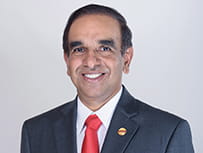What were they thinking when they hired me? They must have made a mistake.” That’s what I thought at my first
post-college job, as a project engineer at the National Aeronautics and Space Administration (NASA) in Cleveland, Ohio. Surrounded by engineers, rocket scientists and researchers, I thought I didn’t belong. “I’m not as smart as they are. They’re going to figure out I’m a phony.”
I was experiencing impostor syndrome. It’s a form of self-doubt that plagues smart, accomplished and well-qualified people, causing them to devalue their skills and dismiss their success. They feel like frauds, as if they somehow tricked the world into thinking they’re smarter than they really are.
The phrase “impostor syndrome” was first coined in 1978 by Drs. Pauline Clance and Suzanne Imes, two clinical psychologists who identified a pattern among high-performing, successful women. Despite external evidence of great accomplishments, these women could not internally accept their own success. They dismissed it, attributing it to luck or people overestimating their intelligence. They felt like frauds. Initially, the experience was thought to be limited to only women, but research since then indicates otherwise. In 2012, Amy Cuddy, author of the best-seller Presence: Bringing Your Boldest Self to Your Biggest Challenges, gave a TED Talk during which she described her own experience of feeling like an impostor. She was inundated with letters from men saying they felt the same way.
At the core of the impostor syndrome is an inability to confess to your success. It’s difficult for you to embrace your expertise and acknowledge your abilities. The result is twofold: You either refrain from taking on challenges, or you take on a challenge but are too worried about failing to enjoy it, even when you do it well.

Many Toastmasters can experience the impostor syndrome, which is often triggered by stepping into a new, unfamiliar assignment. Their confidence doesn’t match their competence. A Distinguished Toastmaster from Connecticut who owns her own marketing consulting firm confessed, “I took a leadership role in the Pathways rollout, and I didn’t feel qualified. I had the training, but I still felt like I needed to know more.” Another member, a pet-care-industry professional, reflected on her involvement in a Toastmasters speech contest: “I volunteered to be club contest chair. I was a one-year member and had never seen a contest. I visited another club first to observe its contest and studied some on YouTube. I figured I would be replaced at any moment for failing. Thankfully, I did not fail.”
Imagine being free from this chronic self-doubt, and able to enjoy the challenge of a new assignment or the success of a job well done. Imagine not constantly wondering if failure is just around the corner. It’s possible. You can match your confidence to your competence to unleash more influence. These four strategies can help.
1 Get the information.
Overcoming impostor syndrome begins with learning about it, and how it can affect people in all fields, including technology, engineering, art/design, education, entertainment, sports, law and business. It affects executives, career changers and entrepreneurs. American actress Sally Field, poet Maya Angelou and Facebook COO Sheryl Sandberg have all confessed to it. Tennis champion Serena Williams and famed author John Steinbeck also struggled with impostor syndrome. Speaking on what it’s like to ascend to the highest position in most organizations—chief executive officer—Starbucks’ longtime CEO Howard Schultz told The New York Times, “Very few people, whether you’ve been in that job before or not, get into the seat and believe today that they are now qualified to be the CEO. They’re not going to tell you that, but it’s true.”
If you identify as a self-doubter, you probably share these symptoms. Typically, when facing a new assignment, you either over-prepare or procrastinate as long as possible and then burst into action. Either way, you do an outstanding job. People praise you, but you can’t enjoy it because you’re thinking “Oh no … I need to do it again!” The cycle repeats when you are faced with the next challenge. You probably also strive for uniqueness or perfection, because being ordinary or mediocre is unacceptable. You often don’t delegate because you think it shows weakness. You’re charming and funny, but it’s meant to deflect attention from the fact that you don’t think you’re smart enough. You do everything you can to either eliminate failure, or completely avoid it. Oddly, you fear success because you don’t think you can repeat it. Finally, you dismiss compliments by attributing success to something random like luck or timing.
“Our thoughts affect our feelings, which influence our actions, which create habits that set the direction and tone of our lives.”
Toastmasters around the world provided input for this article. A successful sales manager said, “After being elected as our club president, I still feel incompetent. I am only a CL! I feel that there are many far more qualified Toastmasters who would be a better leader for our club.” Another member, a well-respected and experienced physician, revealed, “When people praise me for a speech, I feel they’re just saying it to be nice.” Yet another member, a highly educated IT consultant, confessed, “I was averse to giving my first speech evaluation. I felt unqualified, and that my evaluation would not do justice to the speaker.” A business analyst implied he’d rather not volunteer for a role than face failure.
2 Examine the accusation.
The self-doubter battles a relentless internal dialogue of incompetence accusations. Our thoughts affect our feelings, which influence our actions, which create habits that set the direction and tone of our lives. Gaining control of our thoughts is essential. Cognitive behavioral therapy explains the link between thoughts and feelings and helps people think differently so they behave differently. It’s a complex process, but a modified condensed three-step approach can be quite helpful.
Step 1: Capture the thought.
When you recognize a symptom, immediately capture your thought. For example, the instant you think “I’m not entering the speech contest because if I fail, I’m a fool,” hold on to that thought.
Step 2: Cross-examine the thought.
Next, evaluate what evidence supports this thought to establish if it’s true or false. “I don’t think poorly of other contestants who don’t win. Why would they think that of me? And what if I win? It would be fun. Plus, rehearsing will help grow my skills.”
Step 3: Counter the thought.
After you’ve captured and cross-examined the thought, then you counter the thought with decisive action. “OK! Sign me up! I’m in!”
3 Cultivate conversation.
Cultivating the conversation means making connections and building community. When you realize you are not alone in this experience its detrimental power is defused. Chances are there are others in your club who feel like you do.
It’s beneficial to be honest, even vulnerable, without losing your dignity. For example, if you’re a first-time contest chair, say, “I want to do a good job. Can you teach me?” Maybe you are evaluating an experienced speaker and you don’t feel qualified. Ask the speaker ahead of time, “What specifically would you like feedback about? I’d like to help you.” If you are a leader, engage others by asking for their help. Your team will have greater respect for you. It will create an opportunity for more people to be involved in the problem, which could lead to a better solution. Most significantly, cultivating conversations like this gives others permission to do the same thing. Transparency is contagious.
4 Collect your documentation.
In 1997, shortly before I left NASA, I wrote a 14-page “job manual” describing every aspect of my job … the policies, the procedures and the people involved. I wrote it to ease the transition for my successor, and it helped immensely. In 2015, I rediscovered the document in a closet. I read it and thought, “Wow. I was good!” I forgot how complex the job was. Putting it on paper forced me to be objective about it.
Try it. Pretend you are training your successor, and create your own “job manual.” Include every detail even if you think it’s mundane or trivial. Then, put the document aside, and revisit it at another time. Then, read it as if it were someone else’s job description. Be as objective as you can; observe the details and complexities. As you read, be impressed with what’s there—because you are impressive.
Need more confirmation? Collect your good press. Keep thank-you notes, letters of appreciation and any type of recognition. Keep your trophies, certificates, special emails, texts, photos, gifts, newspaper clippings, magazine articles, plaques, performance appraisals, promotion letters, even old pay stubs (which validated that what you did warranted cash compensation!). This is all evidence of your competence. Review them, believe them and enjoy them—frequently. You earned them. It’s not egotistical; it’s essential to overcoming your self-doubt. Resist the temptation to discount them or explain them away as luck or some other random factor, because you did your part to earn the recognition. Don’t discount an award if it wasn’t as high as you wanted, because
Similarly, don’t confuse being the expert with being an expert. There’s plenty of room for many experts on the same topic.
Pushing Your Envelope
In the jet-engine industry, every aircraft engine has its own “operating envelope,” the range of speeds and altitudes that allow safe operation. At NASA, we would often “push the envelope,” and run the engine past its normal safe conditions to test a new concept. It almost always produced a new and larger operating envelope.
“Giving your best beats being the best.”
You have your own operating envelope. But it can be larger. Toastmasters is the ideal laboratory for pushing your own envelope. You can turn down the volume of that limiting impostor syndrome that kidnaps your confidence. These strategies can free you, so you can push the envelope of your self-imposed limitations. You can be bolder and more courageous. You can take more risks and truly enjoy your success, as other Toastmasters will confirm.
A DTM who is a project manager by profession says, “Getting feedback for my speeches helped me overcome self-doubt and increase my self-confidence. While it helps me in Toastmasters, the big benefit is at work and other organizations.” A club president who works as a college instructor says, “Overcoming self-doubt can’t help but spill over into your everyday life. It’s as if you’ve put on something—confidence—and you wear it everywhere.”
Maureen Zappala, DTM is a former NASA propulsion engineer. Today she’s a professional speaker, author and presentation skills coach, as well as founder of High Altitude Strategies, a coaching and speaking service. Visit her website to learn more.


 Previous
Previous
 Previous Article
Previous Article

